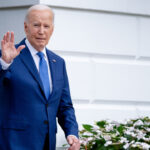The U.S. House Select Committee on Strategic Competition between the United States and the Chinese Communist Party (CCP) raised concerns on Thursday about the Chinese regime using its Belt and Road Initiative (BRI) to indebt and exert influence over the developing world.
During a hearing titled “All Roads Lead to Beijing? The CCP’s Global Development Offensive,” committee members heard from Ronald Reagan Presidential Foundation and Institute President and CEO David Trulio, Center for Strategic & International Studies (CSIS) Senior Vice President Daniel Runde, and Brad Parks, executive director of AidData at William & Mary’s Global Research Institute.
Mr. Trulio testified that the BRI has a presence in over 100 countries worldwide.
Concerns were raised about the impact of BRI on human rights, with Mr. Trulio stating that deeper integration to China through the BRI could constrain countries’ ability to advance human rights due to Chinese coercive pressure.
Mr. Trulio also mentioned the potential dual or triple use of BRI projects, such as commercial ports having intelligence or military implications.
‘The CCP Is Not Acting as a Creditor in Good Faith’: Auchincloss
Rep. Jake Auchincloss expressed concerns that BRI projects are trapping developing countries into unaffordable projects and turning them into forms of subservience to the CCP.
Committee Chairman John Moolenaar highlighted the stark difference between how the U.S. and China approach foreign economic development projects.
China Calls BRI ‘Debt Trap’ Accusations Overhyped
Chinese officials have denied claims that the BRI is a debt-trap program, calling such characterizations malicious. Chatham House also offered a defense of BRI, stating that economic factors primarily drive the initiative.
Dr. Park echoed similar sentiments in his testimony, refuting claims of “debt trap diplomacy” by China.
US Should Offer ‘Competing Terms’ to Counter CCP: Krishnamoorthi
Mr. Runde suggested that the U.S. should offer alternative solutions to compete against the BRI rather than simply urging countries to avoid ties with China.
Dr. Park noted that China has made course corrections to address grievances of BRI participants, emphasizing the importance of the U.S. offering competing terms.
Rep. Raja Krishnamoorthi (D-Ill.), the ranking member on the House Select Committee on the CCP, expressed similar views in his comments to NTD News after the hearing.
“We should offer competitive terms and actively engage in this issue to prevent the Chinese from developing deepwater ports that could pose a threat to our national security. Strengthening our soft power is also crucial,” Mr. Krishnamoorthi stated.
Mr. Auchincloss highlighted that the United States possesses strong capabilities in global economic development, but emphasized the need to streamline processes and act swiftly in order to remain competitive.






